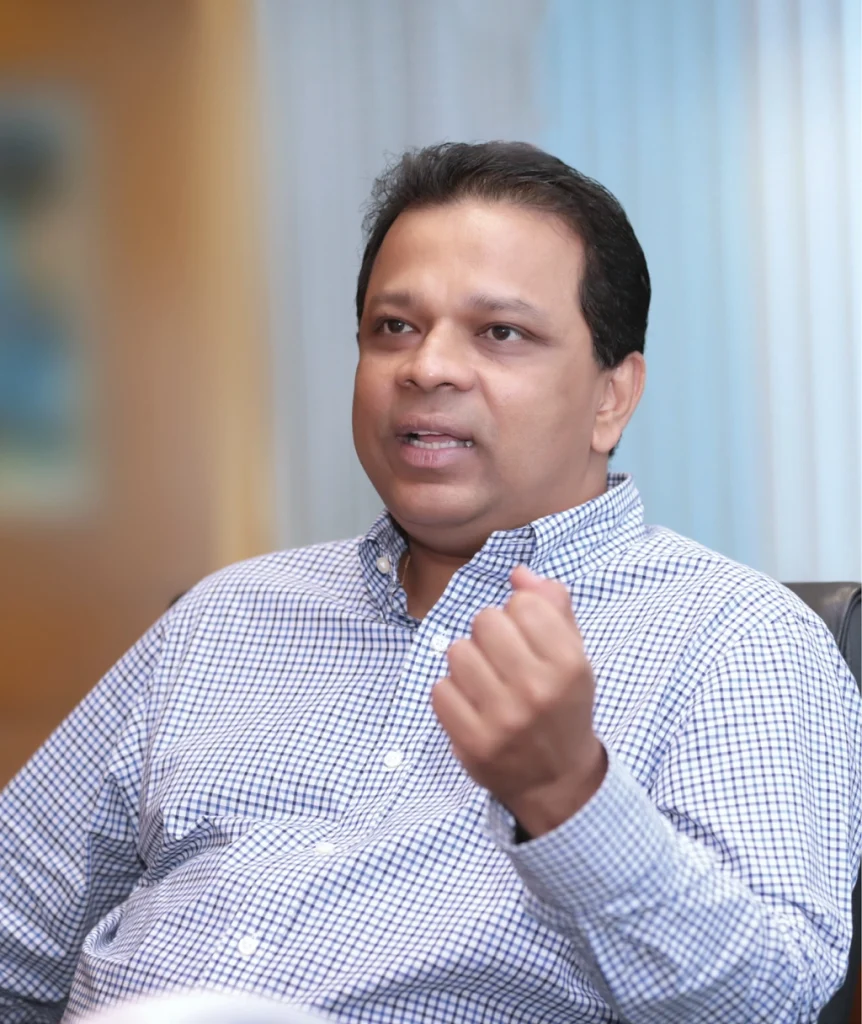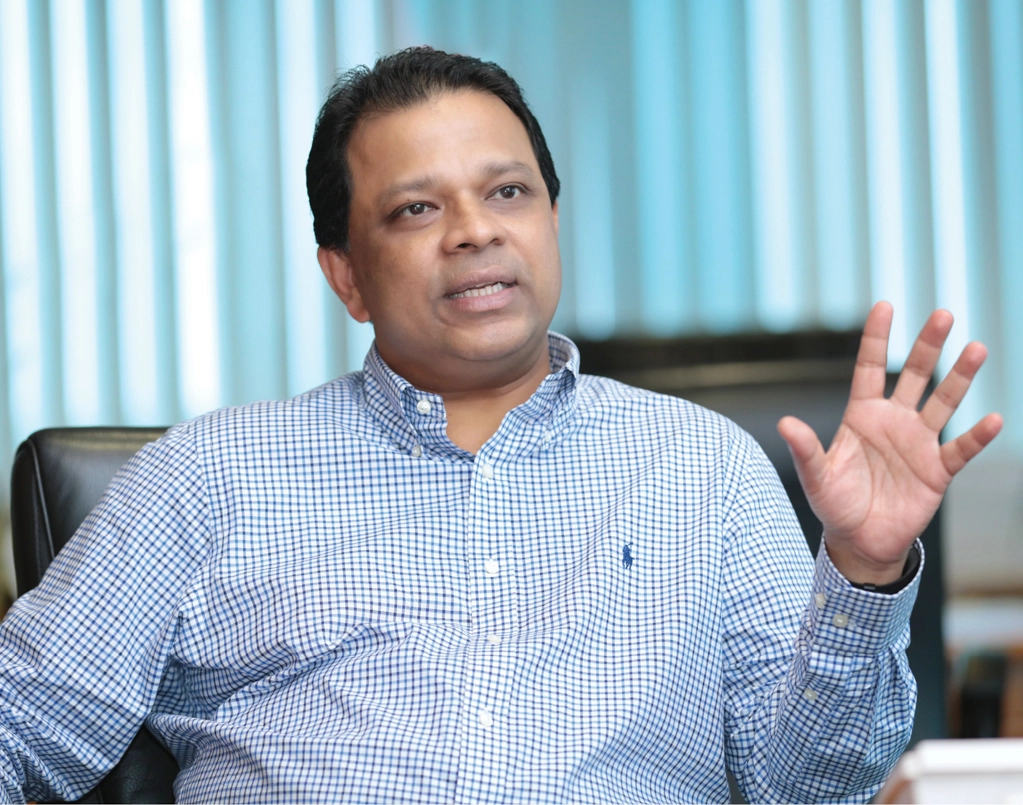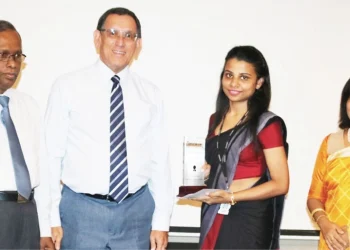
Standing as a source of continuous pragmatic innovation, Hatton National Bank (HNB) has over the recent past, devoted its focus towards the steady development of its product and service portfolio in order to meet the evolving market dynamics and customer needs. HNB Managing Director/CEO, Jonathan Alles believes that this new service paradigm requires banks to not only maintain stability, but also display strength and agility across the breadth of its front and back-end operations in order to attract a larger number of commercial and retail customers. He says, it is the continuous infusion of professionalism, innovation and productivity that will determine how effectively Sri Lankan banks respond to these changing conditions.
By Udeshi Amarasinghe Assisted by Dilini Fernando
Photography Mahesh Bandara and Vishwathan Tharmakulasingham
Can you elaborate the performance as well as the measures that HNB has taken over the past?
HNB has performed exceedingly well over the recent past, and this remarkable performance was directly a result of initiatives implemented over the last three to four years. At the time when I took over the reins of HNB in April 2013, it was a period during which the value of gold had declined drastically, leading to severe impacts on gold pawning businesses locally and internationally. These conditions created significant negative impacts across the banking sector. Even HNB was not immune to this impact as our pawning business accounted for over 15 per cent of our balance sheet at the time.
Following these developments, HNB underwent a transition, during which time we had to rely more on corporate banking transactions while we readjusted our retail banking business to mitigate immediate gaps in revenue. Simultaneously, we reevaluated our internal processes as well with the creation of a Process Re-engineering Department which oversaw realignment and refinement of our operations across multiple facets of the business.
While several of these initiatives only began yielding tangible returns more recently, some of them were almost immediate. Accordingly, HNB was able to record a nearly ten percentage point improvement in the Cost-Income Ratio over time, with the ratio improving from 53 per cent in 2012 to 42.5 per cent at the end of 2016. We have also been working to drive optimisation across all of our business verticals while strengthening the balance sheet. Similarly, HNB has also invested significantly towards upgrading IT and other back-end systems to support frontline operations, substantial process automation and improve our MI capability.
In fact, 2016 was a very special year for HNB, during which we were able to achieve an outstanding growth in profits, to close the year as the most profitable private commercial banking group in the country. HNB’s loans and deposits in 2016 closely followed the industry. However, our focus was on driving efficiency and optimising balance sheet growth. This strategy has proved to be immensely rewarding for HNB, as reflected across several KPIs, such as our strong Return on Assets, Return on Equity, and Cost-Income Ratio, all of which stood well above the market average. Similarly, our NPA ratio was brought to 1.8 per cent as a result of the work that we did to strengthen recovery management and underwriting standards.
Our Corporate Banking business was able to grow its book at attractive margins over the past year with the payments and collections business, trade finance, working capital and ancillary business helping to grow the wallet share. Consequently, HNB was able to record significant growth in the SME sector and has since ventured into supply chain financing as well as distributor financing – both areas in which the bank has enjoyed strong growth and is geared for greater performances in the coming year.
Our Corporate Banking Business Was Able To Grow Their Book At Attractive Margins Over The Past Year With The Payments And Collections Business, Trade Finance, Working Capital And Ancillary Business Helping To Grow Wallet Share.
HNB was also recently named the Best Cash Management Bank in Sri Lanka by Asiamoney – a space that is normally dominated by multinational banks, and our success in this field speaks to the growing strength of HNB enabled by our expanded systems and capabilities. However, despite the remarkable achievements of HNB over the past few years, I would say that we are still only at the start of our journey, and there are many more innovations set for the bank in our continuing transformation. Moving forward, we will continue to focus on improving our Cash Management proposition for corporate, mid-market and SME clients.
Meanwhile, we are also channelling substantial resources towards the continuous refinement of our personal banking business where we enjoy market leadership. Currently, HNB operates through 250 branches spread across the length and breadth of the country, complemented by an extensive ATM and Cash Deposit Machine network.
Our focus on expansion through digital channels saw a drastic up scaling of HNB’s internet and mobile banking offerings, which over the last year enjoyed increased traffic, supported by enhancements to functionality and user experience. The core of this strategy is focused on not just on-boarding clients, but also retaining them and incentivising them to make use of our products and services by offering unparalleled convenience, simplicity and reliability in our internet and mobile banking platforms. Technology is at the heart of these transformations that enable seamless banking experiences that are capable of delighting the customer on one end, and sharpening operational and administrative processes on the other, all with the singular goal of delivering ultimate convenience to the customer.
The on going centralisation of HNB’s administrative and documentary functions has empowered our branch teams to take a much more proactive stance with regard to customer engagement. The Centre of Excellence Unit oversees and processes all retail credits while the most recent milestone in our centralisation effort – the Centre of Aspiration (CoA) Unit -handles all recovery and collection related issues of the branches. The recent launch of the CoA unit is expected to lead to further improvements in our NPA ratio by helping with recovery efforts and preventing overdues flowing from 30 days to 60 to 90 because they are being called at an early date via the call centre that is in place.
Meanwhile, HNB has been developing and regularly updating progress on our Vision 2020 Strategic Plan, reinforced this year through the hosting of strategic workshops focused on stringent analysis of existing plans and KPIs. Essentially, our Vision 2020 is centred on the establishment of certain key goals and milestones from 2018 to 2020. To that end, HNB has created cross functional teams in order to drive CASA, asset quality, digitalisation, new business, product development and lean management. Central to this strategy is the overarching goal of delivering a unique experience to our clients. Our updated value proposition revolves around an unparalleled product offering and unmatched service delivery.
These efforts to hone client experience and digitalisation are all powered by our people. A happy team of employees is absolutely fundamental to the kind of success enjoyed by HNB in the past. Moving forward, there is a more qualitative aspect to our approach, and at the heart of it is the EVP – Employer Value Proposition. Essentially what this means is that we also consider the value that we create for our employees through every aspect of the business.
Fortunately, Majority Of The Sri Lankan Banks Are Well Capitalised And HNB Raised 14.5 Billion Rupees Through A Rights Issue In July 2017, Which Stands As A Record For The Highest Sum Ever Collected By A Private Commercial Bank In Sri Lankan History, Placing HNB As One Of The Best Capitalised Banks In The Country.
Whilst we do all that we can to make this a great place to work, the cooperation and support we get from our staff has been tremendous. This year we witnessed unprecedented success in terms of our achievements. We were adjudged by The Banker as the ‘Best Bank in Sri Lanka’. This was endorsed domestically with HNB being recognised as the highest ranked bank by Business Today. In addition we were recognised locally as well as internationally on many fronts including SME, retail, microfinance, Islamic banking, information technology, financial reporting, investor relations, corporate governance and sustainability. We would not have won all these awards and accolades were it not for the unwavering commitment and dedication of our staff. It is a collaborative, wholesome, and complete effort exerted by one strong team of 4,500 people working together with one focus and one vision to drive optimum value for our stakeholders.
What were some of the key challenges faced by HNB over the years and how were these overcome?
At the macro level, we would have preferred to see more growth, more development activity and more productivity across the country. In this regard, the droughts, floods, and other climatic conditions have weighed down growth and harmed the life and livelihoods of many thousands across the island. From an industry perspective, this has led to problems with collections and a creeping escalation in non-performing advances. I would say that these conditions have also prevented HNB from being more aggressive in extending credit to consumers. Hence it has been a year that necessitated the careful reevaluation of our portfolio and looking at how best we should approach the next three years, 2018 to 2020. One of the main positive developments arising out of these challenging conditions has been the process of internal realignment and the formation of a clear understanding as to what is required for HNB, moving forward.
To some extent, we have been hampered by the inconsistency that surrounds us. Sometimes, we are caught off-guard with the frequency of changing policies. In this regard, it is heartening to note that the Central Bank and the Governor have taken a very progressive approach that focuses primarily on ensuring stability of the monetary policy. This is vital for continued development and I feel that aspect has been fully recognised by CBSL and has immense value for the banking industry as a whole.
Although the developments in the fiscal front are also encouraging, the ad hoc taxes proposed, similar to the super gains tax which was imposed in 2015, raises concerns for the industry. As per the 2018 budget, the government expects to raise 20 billion rupees from the banking industry through the debt repayment levy. We are fully cognizant of the fact that the Government requires to increase revenue for the development of the country. If that 20 billion rupees remain within the banking industry as capital, the banks are able to leverage and lend 200 billion rupees to the economy and support economic growth aligned with the national development policies. This 200 billion rupee lending by the banking industry will facilitate new projects and create entrepreneurial and employment opportunities for the country and its people. The Government can generate far greater revenue through taxation from these projects and opportunities as well as the profits generated by the banking sector by leveraging the 20 billion rupees as equity.
On another note, this is a time where all over the world banks are under-capitalised. Fortunately, majority of the Sri Lankan banks are well capitalised and HNB raised 14.5 billion rupees through a rights issue in July 2017, which stands as a record for the highest sum ever collected by a private commercial bank in Sri Lankan history, placing HNB as one of the best capitalised banks in the country.
With capital buffers being made necessary under BASEL III and ICAAP, it is important that banks remain strongly capitalised. This, in turn, gives confidence to investors as well as rating agencies on the strength and stability of the Sri Lankan banking system. We should be a strong banking industry that is vibrant and ready to face the future while supporting the country.
At an industry level, competition is quite intense, whilst we operate in our own niches, there is a sense of overcrowdedness. In that regard, I believe there is still scope for some form of consolidation to take place, leading to bigger banks with even stronger balance sheets. This is true for the state banks as well as banks in the private sector. However, if we take the consolidation route, it should be done for the right reasons. The need to rationalise branches as we move in to a digitalised environment will also have to be considered. One of the key challenges will be to ensure that there are no negative impacts on people as we integrate processes and systems. It is also vital that the cultures of such entities are compatible so they blend well within the new consolidated entity.
We Also Need To Seriously Consider Digitalisation And The Skills Necessary To Embark On This New Path At A Rapid Pace To Match Global Changes Taking Place In The Banking Industry.
Meanwhile, we also need to seriously consider digitalisation and the skills necessary to embark on this new path at a rapid pace to match global changes taking place in the banking industry and adapt these skills to meet the precise needs of the Sri Lankan market in a sustainable manner. These are challenging but interesting times, and we need to make sure that we have the resources in place and up-skilling necessary to meet these challenges with confidence.
It is ironic that increasingly we see many of our younger staff members doing the four to five year cycles while expanding their horizons beyond banking by undertaking higher studies locally or overseas and moving within the industry or migrating into different industries. This is contrary to a few decades back when we joined the industry. The intention was for long term, secure and stable careers which the industry afforded. Whilst today we have many of our colleagues retiring at 55 years with more than three and a half decades of service, it is unlikely that this trend will continue in the future. In such an environment, balancing career development, succession plans and managing the training budget into something meaningful, that brings value to the staff as well as to the bank, is a new interesting challenge that we have.
Do you have any ideas of venturing out of Sri Lanka to acquire new markets?
We are certainly interested and always open to such opportunities, however, we also see tremendous growth potential within Sri Lanka. Hence, in Sri Lanka we will continue to grow our core operations. HNB, unlike other players in our industry, is a banking group. We have our own insurance – life and general, which can grow substantially. Insurance is a new area with about ten per cent penetration and a lot more potential. We are into investment banking through Acuity where we have a joint venture partnership with DFCC. Acuity also offers venture capital through Lanka Ventures and fund management through Guardian Acuity Fund Management. Most recently we acquired Prime Grameen, which is today known as HNB Grameen, and that increases our foray into microfinance in addition to what the bank does. We still remain interested in growing inorganically within and outside Sri Lanka, maybe initially evaluating regional markets. To test some of these markets, we have placed debt in a few of those economies. The responses so far have been good. As we learn more and more, we would be interested in considering a nominal stake as long as the investment can be justified.
In The Short Term, We May Have To Exercise Certain Tightening Measures To Avoid Wastage, Unnecessary Expenditure And Manage Costs Better. All Businesses, Whether State Or Private Sector Should Be Run Professionally And Productively.
What is your outlook on 2018?
Quietly confident, is what I would say. Both the country as well as the industry have had a fairly moderate 2017. We envisage far more significant economic development activity in 2018 and 2019 and, in that light, we are already starting to see signs that signal opportunity for the banking sector. Whether it is in various national development and infrastructure development projects or business expansion in the corporate sector and in SME – the engine of growth where we see immense potential, we will continue to ensure a partnering role in all of these sectors.
Our passion for growing the microfinance sector, improving and promoting inclusivity, is part of an ethos of sustainable banking that we believe has tremendous potential to grow. We may not see a glut of lifestyle banking opportunities on personal finance or consumption banking, however, we do see a great opportunity for very responsible lending towards housing. That is an area we are keen on. Housing as well as education are priorities for us in terms of the personal banking sector. Economic analysts predict that the interest rates should remain stable with the potential to decline marginally if inflation can be controlled and lowered to the expected mid single digits. With the anticipated foreign direct investments, we have also started to see exports and tourism earnings picking up and if that continues to perform well, we do not see a great reason for the currency to depreciate more than the usual two to three per cent per annum. In that context we believe that HNB will be aggressive over the next two to three years and play a central role in supporting the development efforts of the country.
What is your message to the corporate sector of the country?
Sri Lanka is at a crossroad and has been for a while. We cannot continue to procrastinate. This is our opportunity and we cannot afford to miss it. All plans and visions have been discussed over and over again and are in place. We must place greater emphasis on implementation. There is a clear need, and an understanding, for greater commitment from all, and I am pleased that we are making progress in this regard.
We need to work together and collaborate in order to drive tourism, exports, IT industries for value and we need to get into other areas of manufacturing for exports, in addition to developing our health and education sectors exponentially to provide better value to Sri Lankans and to make the sectors accessible to foreigners as well.
All stakeholders of Sri Lanka should join together in order to contribute towards the development of our country. It is all about realising the dream, implementing plans, and reaping the fruits of these developments for the people of our nation. In the short term, we may have to exercise certain tightening measures to avoid wastage, unnecessary expenditure and manage costs better. All businesses, whether state or private sector should be run professionally and productively. We should have the right governance structures in place to say no to corruption, promote honesty and integrity, and develop the right KPIs in order to drive our businesses in a responsible and sustainable manner.






